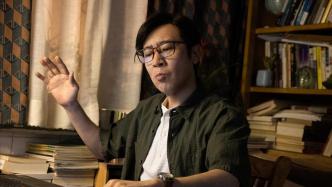
Note: This article contains spoilers
At the beginning of the movie "Second Hand Masterpiece", there is a very important reminder, "This story is purely fictional." Because the movie tells the story of a father and son's "ghostwriting" scandal, it may remind some people of certain doubts in our real lives. Movies may be afraid of the audience's association, but they are also afraid that the audience will not associate it - after all, this association itself is enough to constitute a gimmick, prompting some people to enter the cinema.
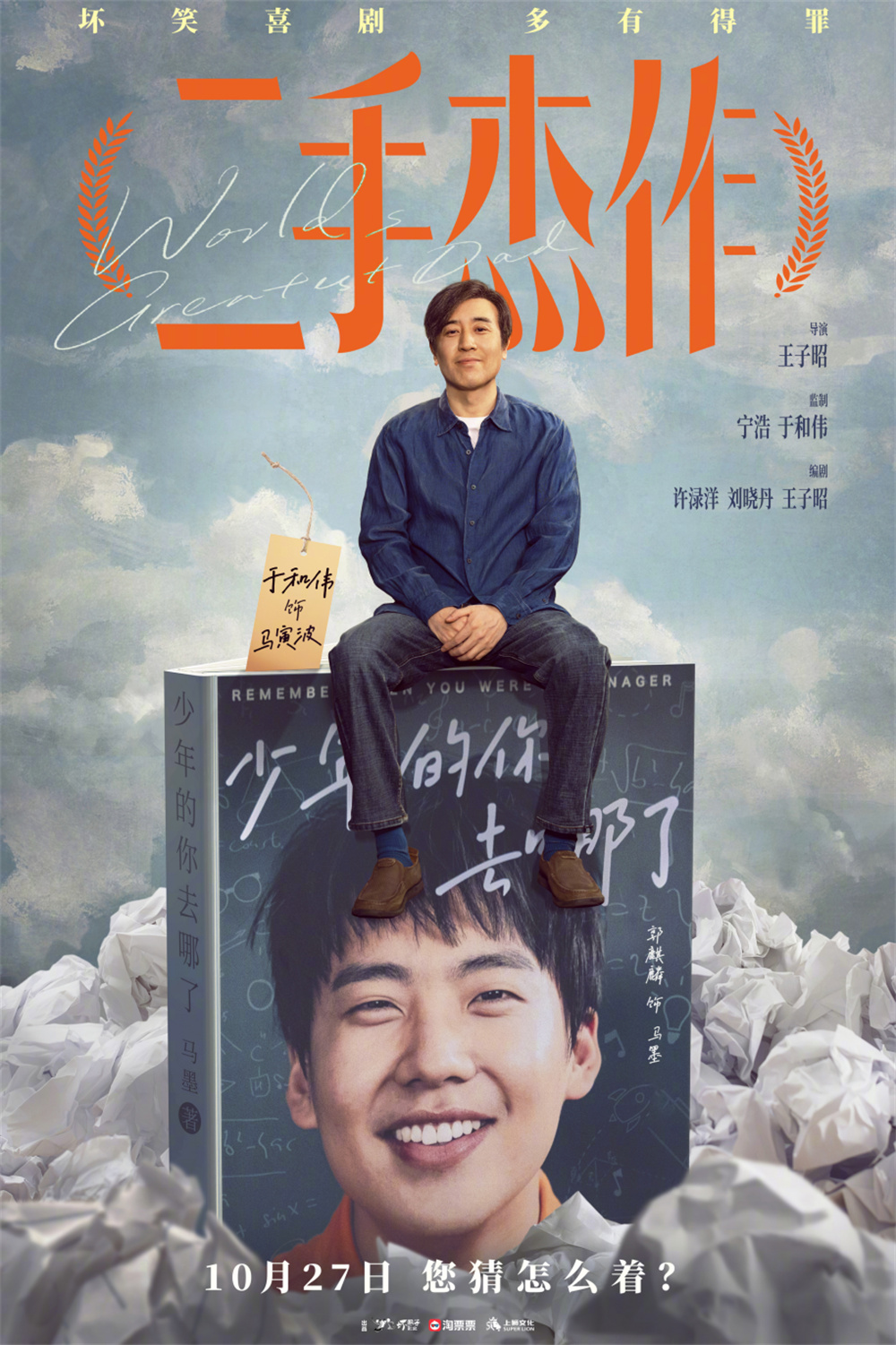
"Second Hand Masterpiece" Poster
It is necessary to clarify this first: "Second-hand Masterpiece" is a satirical comedy, but it is not based on a prototype in real life - although it may have been "fused" with localization. The movie is adapted from "The World's Greatest Dad" starring Robin Williams. This movie was released in 2009 and tells the story of a father ghostwriting for his son. "Second Hand Masterpiece" also noted this adaptation information at the end of the film, but some viewers who have not seen the original film inevitably thought that "Second Hand Masterpiece" must be alluding to something.
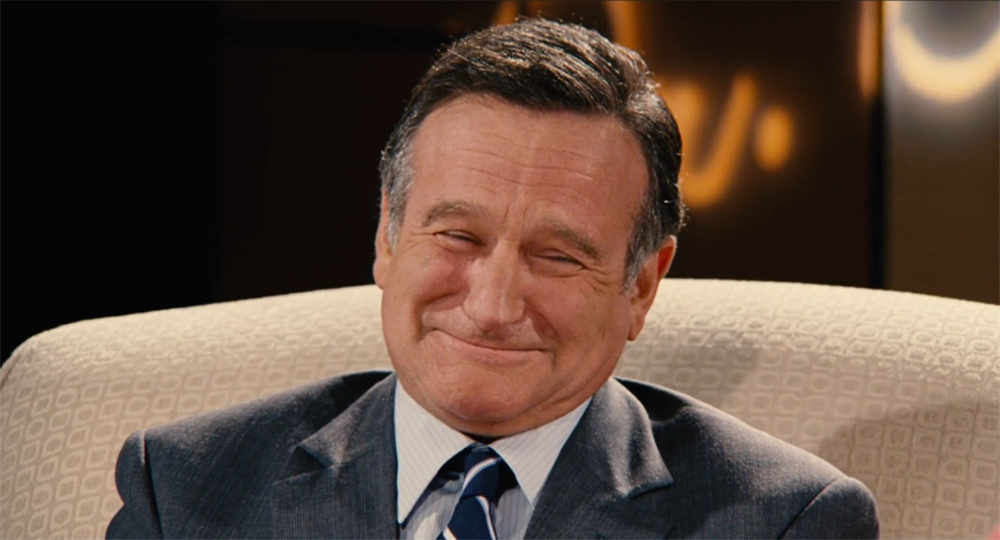
Movie adapted from "The World's Greatest Father"
Ma Yinbo (played by Yu Hewei), a high school Chinese teacher who has reached the age of knowing his destiny, encounters a serious mid-life crisis - when he reaches middle age, he has accomplished nothing. Ma Yinbo has always dreamed of becoming a writer, but over the years he has submitted manuscripts to publishing houses and received only rejection letters.
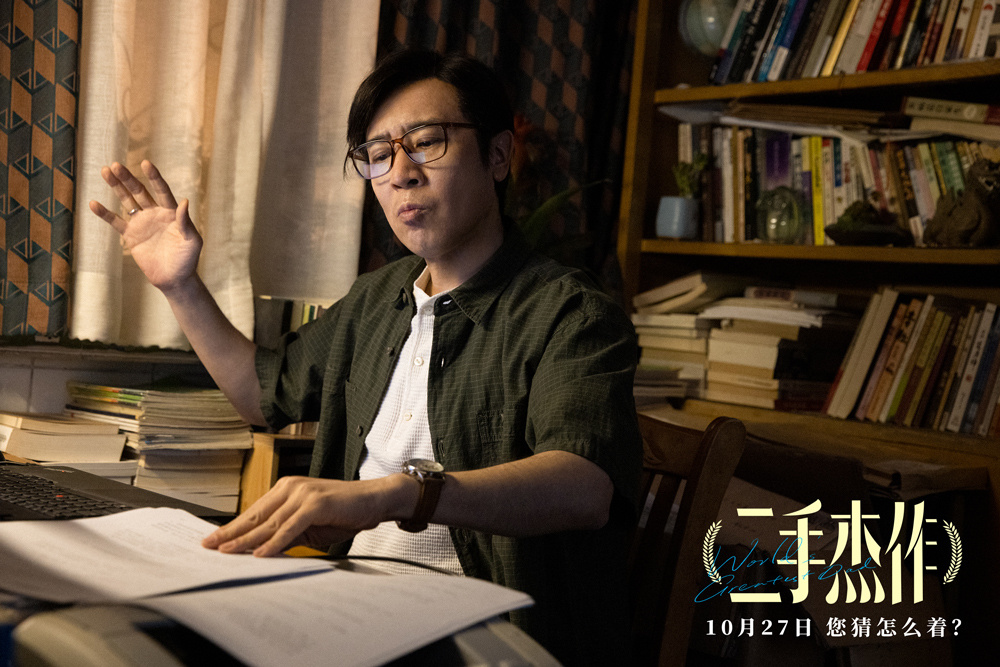
Ma Yinbo (played by Yu Hewei)
I also do a mediocre job, my classes are average, and I am not popular with students. I don’t make much money, and I still live in a house bought by my father-in-law.
In family life, when facing the needs of his wife Pan Dongni (played by Ni Hongjie), his body can no longer stand it and faces the crisis of "Farewell to weapons".
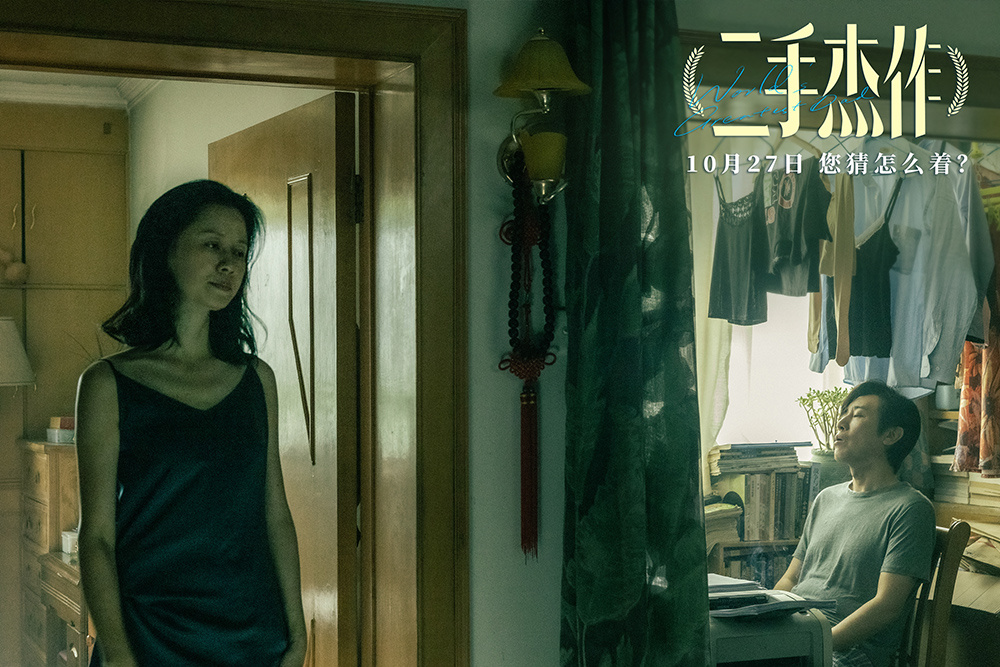
Pan Dongni, left (played by Ni Hongjie)
In terms of father-son relationship, Ma Yinbo places a large part of his hopes on his son Ma Mo (played by Guo Qilin). He hopes that his son will become a successful man and has ardent expectations for his son. He also hopes that his son will give him a long face. However, Ma Mo is a bit "dumb" and has already repeated his first year of high school twice; what's even more frightening is that Ma Mo likes to take secret photos of the girls he likes.

Ma Mo (played by Guo Qilin)
The son in the original movie was an extreme nymphomaniac. Ma Mo has been weakened by the screenwriter, but it is still difficult to be accepted by domestic audiences. It is not so much that Ma Mo is the first love interest in adolescence, but rather sexual harassment. When Guo Qilin took this role, he really "sacrificed" for the show, otherwise he would not be likable at all, and he would be quite a tool. And Ma Yinbo's approach of protecting the calf will definitely be strongly criticized by some viewers.
The first important turning point in the story was caused by Ma Mo. He climbed up the outer wall of the girls' dormitory building and secretly photographed his favorite classmate Xu Sisi (played by Xu Enyi). He accidentally fell from a height and fell into a coma, possibly becoming a vegetative state. Why Ma Mo fell has become a topic of discussion in the school.
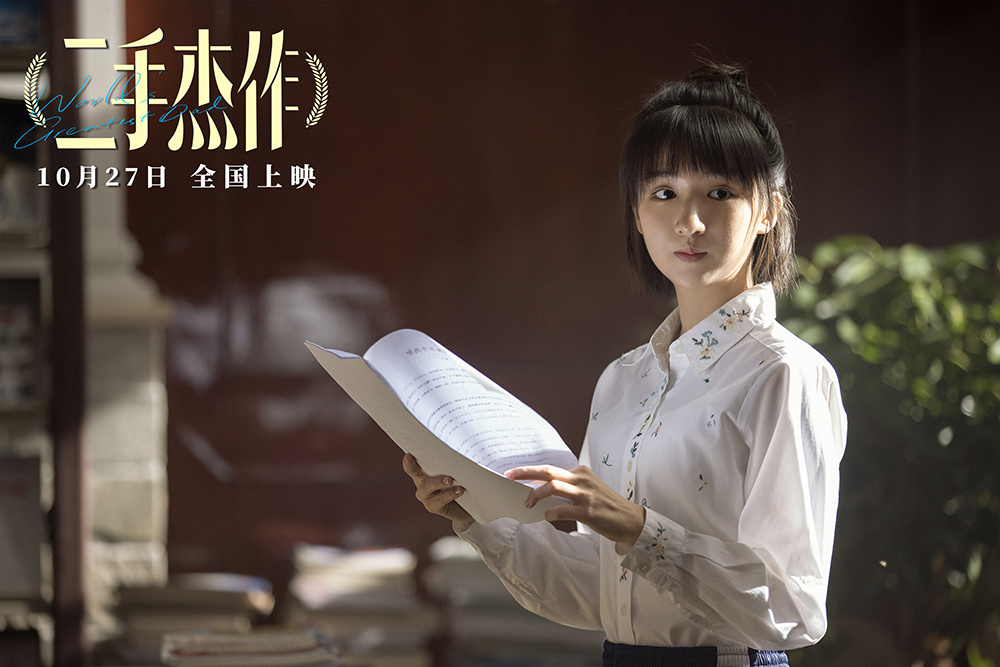
Xu Sisi (played by Xu Enyi)
Faced with the ridicule of his son for "playing a hooligan", Ma Yinchu couldn't save his face at all, and he could not accept this fact. In order to give his son, and more importantly, to give himself some dignity, he fabricated his son's suicide note. After all, "suicide after the whole world was in chaos and I woke up alone" sounded much better than "falling down after playing a gangster."
By mistake, Ma Yinbo created the image of a wise, melancholy, talented young man who was not understood and accepted by the world in his ghostwritten suicide note, which hit the needs of people nowadays. Ma Mo quickly became a man of the school and a hero of the era. Man of the hour. Ma Mo's "composition" (actually Ma Yinbo's work) was widely circulated in schools. Keen publishers seized the business opportunity and published Ma Mo's collection of works "Where Have You Been, Young Man", which became a best-seller with sales exceeding one million Book.
As a result, the son "died" and the father became "popular".

Ma Yinbo went on various programs to promote his son, but in fact he was promoting his dream of becoming a writer.
Ma Yinbo was addicted to this fantasy. His son's popularity finally gave him an addiction to being a writer. He has been writing silently for twenty or thirty years, hoping that his works can be published, have readers, and be "discerning". He has "indirectly" realized this dream.
In the original movie, the son really died. The core change in "Second Hand Masterpiece" is that the son lived and finally woke up. Ma Yinbo asked his son to continue singing this play, but Pan Dongni, who was sober, asked her son to announce to the entire network that it would be closed from now on.
Ma Yinbo, who didn't want his dream of being a writer to be shattered, believed that without Ma Mo's halo, he could become famous by relying on his own strength. He insisted on publishing a book, even if he published it at his own expense, he still had to prove his ability.
Reality poured cold water on him. Without the gimmick of "Ma Mo's father", he would be nobody. No media attended his book launch, and there were no readers to buy his book. He frantically spent money to buy sales and good reviews on Douban, and finally promoted his book to the top of the rankings, but at this time he was investigated by the Industrial and Commercial Bureau. Ma Yinbo entered a state of "madness"...

Ma Yinbo “produces and sells by himself”
In the original work, the father ultimately loved his son more than fame and fortune, and he finally accepted his son's misery and became the greatest father in the world; but Ma Yinbo always loved himself and fame and fortune, and he did not hesitate to step on his son to climb up. Therefore, the main plot of "Second-Hand Masterpiece" can be summarized as "Ma Yinbo's dream of being a writer". It satirizes people like Ma Yinbo - half-hearted literary and artistic youths who fall into a state of paranoia.
Of course, literary youth is not a derogatory term, but half-hearted literary youth is. They have not read that many books and are not that talented, but they are very confident. This self-confidence puts them in a psychologically advantageous position and looks down on all living beings. Young people who are half-hearted in literature and art often cannot understand this or that. He is so aloof that anyone who does not admire him will be swept into the ranks of the "mediocre".
Do you really think they love literature and art that much? That's not it either. What they love is the specialness that literature and art gives them - because they are very literary and artistic, the world can treat them differently, such as looking up to them and satisfying their sense of vanity. In other words, they seem to be devoid of desire and focus on art, but in fact they care more than anyone else about how to convert literature and art into what they care about. Such as fame and fortune, such as the recognition or admiration of others.
Unfortunately, it is easy to see through the superficial nature of half-hearted literary and artistic young people, and there is a high probability that they will not be able to achieve their dreams. This kind of underappreciated talent and resentment will turn into anger, as if the whole world is against him, and half-hearted literary and artistic young people will most likely become angry youths.
Ma Yinbo is a half-hearted literary and artistic young man. A little talented, but not enough to write a book. The accident of his son's "death" made his son's works become best-sellers, making him think that his dusty talent was finally seen by the world. He fell into a state of paranoid self-confidence and could not clearly see how much he weighed.

Ma Yinbo gave his book good reviews
The movie actually gave Ma Yinbo a way out: let go of his vanity, see his own weakness, and reconcile with himself. There really aren’t that many buried Van Goghs in the world, and a little more humility is never a bad thing.
The movie satirizes not only Ma Mo, but also "the world". The changing attitude from teachers to classmates in school is a vivid interpretation of "worshiping the superior and suppressing the inferior"; the public's blind pursuit of hot topics has also given rise to a series of strange current situations that cater to hot topics.
The movie also vigorously satirizes all living beings in the cultural circle - this part is almost a localized original of the movie.
There is a circle of literary and artistic youth. For example, Xu Sisi, a female classmate whom Ma Mo has a crush on, dreams about literature and art, but she has no half-hearted talent. Her understanding of the world is roughly at the level of youth pain literature. "Like is unrestrained, love is restrained." She thinks it will There is a talented and lonely young genius who comes to pamper her... Looking at her deep into the drama, I always feel that there is an heir to Ma Yinbo's mantle.
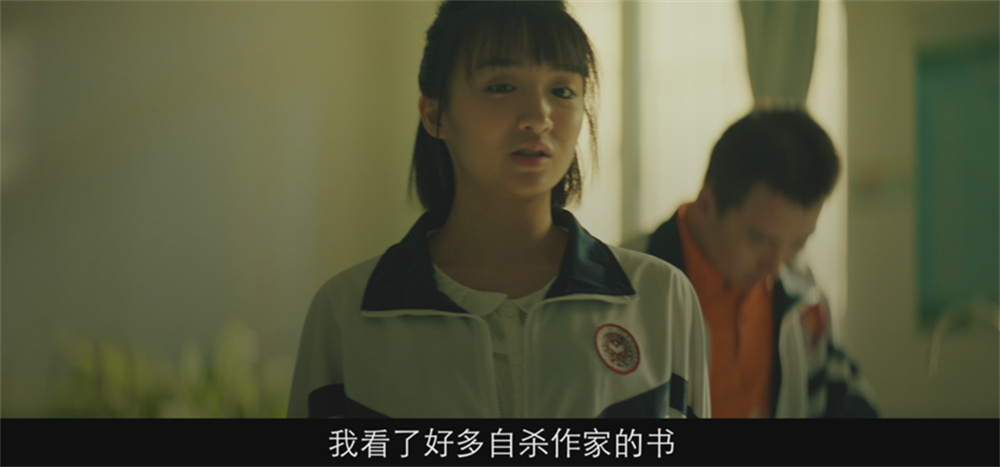
Xu Sisi is also very "into the drama"
Douban appears frequently in movies. In the context of movies, there are a lot of people like Xu Sisi stationed on Douban. When the Douban group "Forever young, always full of tears, always on the road" came out, the irony was really high. …
There are those in the media and publishing circles. The media will follow the trend and report; what to do if the media does not come to the press conference, what to do if the reviewers do not give praise, give red envelopes, Ma Yinbo explained with the logic of "stealing is not stealing", this is "treating guests to dinner for literature"; publishing The president of the company (played by Feng Lei) is actually a big businessman who is only interested in profit. He never gives up any opportunity for promotion. After packaging the melancholy boy, he promotes the role of a barmaid; what if the number of words is not enough to publish a book, "the words are large and the lines are sparse" Come and join in...
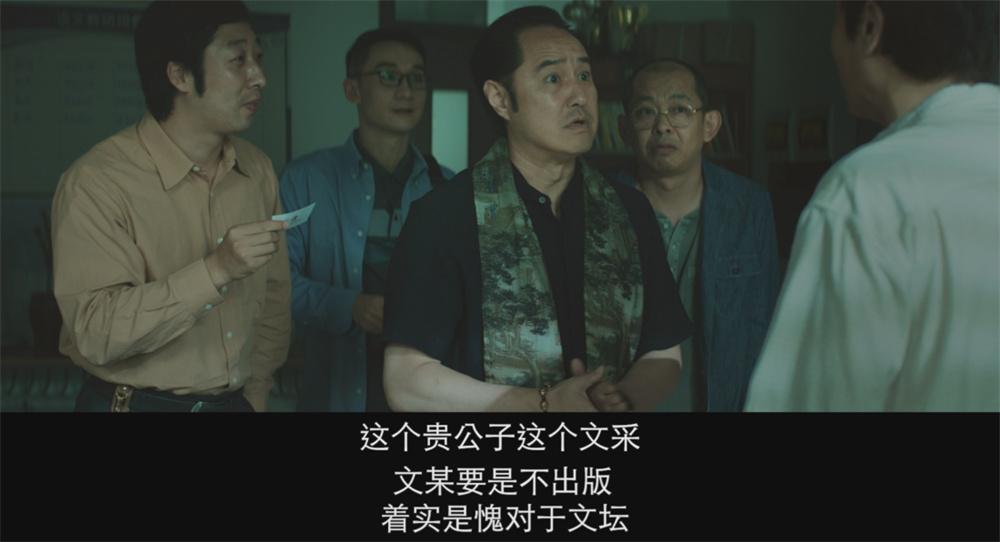
President of the publishing house (played by Feng Lei)
There are also literary and art awards circles. This part of the connotation is a bit heavy. Ma Mo participated in an essay contest for a youth literature competition and entered the finals amidst the admiration of the judges. However, he was absent from the finals (still lying in bed). Although he did not win the grand prize, he still got it. The biggest limelight...

Treating guests to dinner for the sake of literature
As a satirical comedy produced by Ning Hao and produced by Bad Monkey, the significance of "Second Hand Masterpiece" is that it continues Ning Hao's satirical comedy creation vein. Although there are many comedy works on the market, there are indeed not many satirical comedies with full firepower. This type of creation should be encouraged more. Satirical comedy can easily offend people, and there are too many things that cannot be satirized—but the point of satirical comedy is precisely to satirize these things.
"Secondhand Masterpiece" certainly has its parts that make people smile, but the movie still feels a bit unsatisfactory. On the one hand, the transition from the original expression to the localized adaptation is not very smooth. It is not impossible to change from "The Greatest Father in the World" to pure satire, but the reconciliation at the end seems light and somewhat inconsistent with the tone of the previous plot. It seems awkward to be detached. It's better to go dark to the end.
On the other hand, the people and phenomena that the movie satirizes were relatively lethal and referential ten years ago. In today's context where literary and artistic youth are indiscriminately belittled, the influence of the media and publishing industry is declining, and they live in the cracks, The movie's ridicule is a bit of a pick-me-up.
"Secondhand Masterpiece" is a taste of satirical comedy, a genre that has limitless potential.


